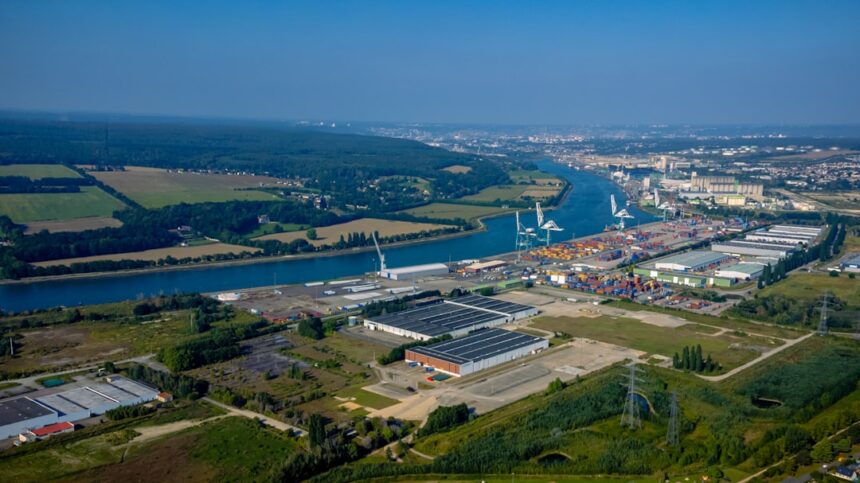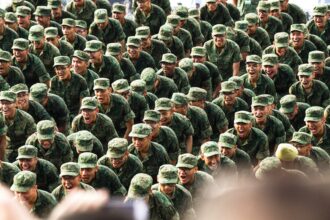The term “Military Industrial Complex” refers to the intricate relationship between a nation’s military, its government, and the defense industry that supplies it. This concept encapsulates the collaboration and mutual dependence that exists between military institutions and private defense contractors. The Military Industrial Complex is often characterized by the significant influence that defense contractors wield over national policy, particularly in matters of defense spending and military strategy.
This relationship raises questions about accountability, transparency, and the prioritization of national security over other societal needs. At its core, the Military Industrial Complex embodies a system where military needs drive technological advancements and economic growth, while simultaneously creating a cycle of dependency between the government and defense contractors. This interdependence can lead to a situation where military interests overshadow other critical areas such as education, healthcare, and infrastructure.
As a result, the Military Industrial Complex has become a focal point for discussions about the balance between national security and the welfare of citizens.
Key Takeaways
- The Military Industrial Complex refers to the close relationship between the military and defense industry, where the interests of both sectors often align.
- The concept of the Military Industrial Complex dates back to President Eisenhower’s warning about the growing influence of the defense industry on government policy in his farewell address in 1961.
- Key players in the Military Industrial Complex include defense contractors, government officials, and military leaders who often work together to shape defense policies and procurements.
- The relationship between the military and industry is characterized by a revolving door of personnel, where individuals move between the public and private sectors, blurring the lines between government and industry interests.
- The Military Industrial Complex has a significant impact on government policy, often leading to increased defense spending and the prioritization of military solutions to international conflicts.
Historical background of the Military Industrial Complex
The roots of the Military Industrial Complex can be traced back to World War II, when the United States ramped up its military production to support the war effort. The collaboration between government agencies and private industry during this period laid the groundwork for a lasting partnership that would extend into the Cold War and beyond. The post-war era saw an unprecedented expansion of military spending, driven by the need to counter perceived threats from the Soviet Union.
This period marked the beginning of a new era in which defense contractors became integral players in shaping military policy. In 1961, President Dwight D. Eisenhower famously warned of the dangers posed by the Military Industrial Complex in his farewell address.
He cautioned that the growing influence of defense contractors could lead to an imbalance in national priorities, urging citizens to remain vigilant against the potential for military interests to overshadow democratic values. Eisenhower’s warning resonated through subsequent decades, as military spending continued to rise and defense contractors solidified their positions within the political landscape.
Key players in the Military Industrial Complex

The Military Industrial Complex is populated by a diverse array of key players, including government officials, military leaders, and private defense contractors. Major defense companies such as Lockheed Martin, Boeing, Raytheon, and Northrop Grumman are at the forefront of this complex, providing advanced technology and weaponry to armed forces around the world. These corporations not only manufacture military equipment but also engage in lobbying efforts to influence government policy and secure lucrative contracts.
Government officials play a crucial role in shaping the dynamics of the Military Industrial Complex. Politicians often rely on campaign contributions from defense contractors to fund their electoral campaigns, creating a symbiotic relationship that can lead to favorable legislation for the defense industry. Additionally, military leaders frequently transition into high-ranking positions within defense companies after their service, further blurring the lines between public service and private profit.
This revolving door phenomenon raises concerns about conflicts of interest and the prioritization of corporate profits over national security.
The relationship between the military and industry
| Aspect | Metrics |
|---|---|
| Defense Spending | Percentage of GDP allocated to defense |
| Contracts | Total value of military contracts awarded to industry |
| Employment | Number of jobs supported by military-industrial complex |
| Technology Transfer | Number of patents and innovations shared between military and industry |
| Regulation | Number of laws and policies governing the relationship |
The relationship between the military and industry is characterized by a complex interplay of collaboration and competition. On one hand, military institutions depend on private companies for cutting-edge technology and equipment necessary for national defense. This reliance fosters innovation and efficiency within the defense sector, as companies strive to meet the evolving needs of armed forces.
The partnership has led to significant advancements in areas such as aerospace technology, cybersecurity, and artificial intelligence. On the other hand, this relationship can also lead to challenges and ethical dilemmas. The pursuit of profit by defense contractors may sometimes conflict with the best interests of national security.
For instance, companies may prioritize contracts over ethical considerations, leading to questionable practices in arms sales or procurement processes. Furthermore, this close relationship can create an environment where military decisions are influenced more by corporate interests than by strategic necessity, raising concerns about accountability and oversight.
The impact of the Military Industrial Complex on government policy
The influence of the Military Industrial Complex on government policy is profound and multifaceted. Defense contractors often engage in extensive lobbying efforts to shape legislation that favors their interests, resulting in policies that prioritize military spending over other critical areas such as education or healthcare. This lobbying can lead to an environment where defense budgets are consistently increased, even in times of economic downturn or budgetary constraints.
Moreover, the Military Industrial Complex can shape foreign policy decisions as well. The need for ongoing military engagement can lead to interventions in foreign conflicts or support for authoritarian regimes that align with U.S. interests.
This dynamic raises questions about the ethical implications of foreign policy decisions driven by corporate interests rather than humanitarian considerations or diplomatic solutions. As a result, citizens may find themselves questioning whether their government is acting in their best interests or those of powerful defense contractors.
The economic implications of the Military Industrial Complex

The economic implications of the Military Industrial Complex are significant and far-reaching. Defense spending constitutes a substantial portion of national budgets in many countries, particularly in the United States. This investment creates jobs within the defense sector and stimulates economic growth in regions where military contracts are concentrated.
However, critics argue that this focus on military spending diverts resources away from essential public services such as education, healthcare, and infrastructure development. Additionally, the Military Industrial Complex can contribute to economic inequality. Regions heavily reliant on defense contracts may experience economic booms during periods of increased military spending but face downturns when budgets are cut or conflicts subside.
This cyclical nature can create instability for communities dependent on defense-related jobs. Furthermore, as resources are allocated toward military endeavors, other sectors may suffer from underfunding, exacerbating social disparities and limiting opportunities for growth in non-defense industries.
The ethical considerations of the Military Industrial Complex
The ethical considerations surrounding the Military Industrial Complex are complex and often contentious. One major concern is the potential for profit-driven motives to overshadow humanitarian values in both domestic and foreign policy decisions. The arms trade, for instance, raises questions about accountability and responsibility when weapons are sold to regimes with poor human rights records or involved in conflicts that result in civilian casualties.
Moreover, there is an ongoing debate about the moral implications of prioritizing military spending over social welfare programs.
This raises fundamental questions about societal values: should a nation prioritize its military capabilities at the expense of its citizens’ well-being?
The ethical dilemmas posed by the Military Industrial Complex challenge individuals and policymakers alike to consider what kind of society they wish to build.
The influence of the Military Industrial Complex on international relations
The Military Industrial Complex plays a significant role in shaping international relations by influencing how nations interact with one another on security matters. Countries with robust defense industries often seek to expand their influence through arms sales and military partnerships with allies or strategic partners. This dynamic can lead to an arms race as nations compete for technological superiority and military capabilities.
When economic interests are tied to military engagements or arms sales, it becomes challenging for governments to pursue peaceful solutions without facing backlash from influential stakeholders within their own borders. As a result, international relations may be characterized more by competition and conflict than by cooperation and diplomacy.
The role of technology in the Military Industrial Complex
Technology is at the heart of the Military Industrial Complex, driving innovation and shaping modern warfare strategies. Advances in areas such as artificial intelligence, robotics, cybersecurity, and unmanned systems have transformed how militaries operate on the battlefield. Defense contractors invest heavily in research and development to create cutting-edge technologies that enhance operational capabilities and provide a competitive edge.
However, this rapid technological advancement also raises concerns about ethical implications and unintended consequences. The use of autonomous weapons systems, for example, poses questions about accountability in warfare and the potential for loss of human oversight in critical decision-making processes. As technology continues to evolve within the Military Industrial Complex, it is essential for policymakers to consider not only its benefits but also its potential risks to global security and ethical standards.
Criticisms and controversies surrounding the Military Industrial Complex
The Military Industrial Complex has faced significant criticism over the years from various quarters, including activists, scholars, and concerned citizens. One major point of contention is the perception that defense contractors prioritize profit over national security or ethical considerations. Critics argue that this profit-driven mentality can lead to wasteful spending on unnecessary weapons systems or prolonged military engagements that do not serve the public interest.
Additionally, controversies surrounding specific military interventions or arms sales have sparked public outrage and calls for greater accountability within the Military Industrial Complex. High-profile incidents involving civilian casualties or human rights abuses linked to U.S.-made weapons have fueled demands for transparency in arms sales processes and stricter regulations governing defense contracts. These criticisms highlight a growing awareness among citizens about the implications of their government’s relationships with powerful defense contractors.
The future of the Military Industrial Complex
Looking ahead, the future of the Military Industrial Complex remains uncertain as global dynamics continue to evolve. Emerging threats such as cyber warfare, climate change-related security challenges, and geopolitical tensions will likely shape how nations approach defense spending and military strategy in coming years. As technology continues to advance at an unprecedented pace, there will be ongoing debates about how best to balance national security needs with ethical considerations.
Moreover, public sentiment regarding military spending may shift as citizens increasingly demand accountability from their governments regarding resource allocation. Advocacy for social programs may gain traction as people recognize that investing in education, healthcare, and infrastructure can contribute to long-term stability and security. Ultimately, navigating these complexities will require thoughtful dialogue among policymakers, industry leaders, and citizens alike as they seek to define a future that prioritizes both national security and societal well-being within an ever-changing global landscape.
The concept of the military-industrial complex, first popularized by President Dwight D. Eisenhower in his 1961 farewell address, highlights the intricate relationship between a nation’s military, its government, and the industries that supply them. This relationship can lead to significant political and economic influence, often raising concerns about the prioritization of military needs over other societal needs. For a deeper understanding of how this complex operates and its implications, you can explore a related article on the topic by visiting In The War Room. This resource provides insightful analysis and discussions on the dynamics of military and industrial interactions.
WATCH THIS! From Tehran to Blackwater: The Real Story
FAQs
What is the military industrial complex?
The military industrial complex refers to the close relationship between the military and the defense industry, where the government and private companies work together to develop and produce military equipment and technology.
How does the military industrial complex work?
The military industrial complex operates through contracts between the government and private defense companies for the development and production of military equipment, such as weapons, vehicles, and technology.
What are the key players in the military industrial complex?
The key players in the military industrial complex include the government, military branches, defense contractors, and research and development organizations.
What are the criticisms of the military industrial complex?
Critics argue that the military industrial complex can lead to excessive government spending on defense, influence foreign policy decisions, and perpetuate a cycle of conflict and war for the benefit of defense contractors.
How does the military industrial complex impact the economy?
The military industrial complex can have a significant impact on the economy through government spending on defense contracts, job creation in the defense industry, and technological innovation that can have civilian applications.




